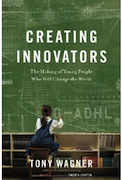College ReadyではなくInnovation Ready
 「フラット化する世界」の著者トーマス・フリードマン氏が3/30付NY Timesのコラム“Need a Job? Invent It” に、
「フラット化する世界」の著者トーマス・フリードマン氏が3/30付NY Timesのコラム“Need a Job? Invent It” に、
いま過去の中流階級を支えてきた「中級スキルで高給がもらえる仕事」がすごいスピードで消え去っている危険な時代に入っている。(中略)中級レベルのスキルで出来る仕事は近々消滅するだろう。(中略)中流階級に所属する人は(スキルをあげて)高度なスキルの仕事に就くか、階級を落とされるか、その選択に迫られている。
と書いています。いまルーチン化出来る仕事が新興国に奪われるスピードがますます加速。ルーチン化出来ない、高度なスキルが求められるも、ニーズがあまりにも複雑化され、どんなスキルを開発すれば良いのか、特にSTEM (Science, Technology, Engineering, Math)以外のいわゆる文系出身者にとってその定義が難く、本来それを担うはずの大学がその目的を果たせていないとフリードマン氏はいいます。
事実3/26付Wall Street Journal紙の記事、College Grads May Be Stuck in Low-Skill Jobsによると:
いま大学を出た人の半分近くが、大学出の必要のない、カフェや小売業の店員に就いているとのこと。さらに恐ろしいことに以前卒業後に高給が約束されていた修士や法科大学院の卒業生でも時給10ドル(1,000円)の仕事に応募している人達が少なくない。
と恐ろしいことが書いてありました。また、2010年の米国国勢調査局データによると2000年に比べ30歳未満の労働人口が67.3%から55.3%に落ちている。また、国民の15%が貧困層に入っているという衝撃的なデータも出てます。
 「大学の卒業が安定したキャリアを約束する時代は終わった。」とハーバード大学で長年教育を研究するTony Wagner氏が最近出した本、“Creatiing Innovators” に書いています。そして、
「大学の卒業が安定したキャリアを約束する時代は終わった。」とハーバード大学で長年教育を研究するTony Wagner氏が最近出した本、“Creatiing Innovators” に書いています。そして、
今日の教育のゴールは『大学に入る (college ready)』ではなく『イノベーションを起こす(innovation ready)』ことである。
と。そして”Innovation ready”の人材を育てるキーワードに”play, passion, purpose”をあげています。
まずはplay。いま、親が子供の生活に入り込みすぎていることにWagner氏は深く危惧します。「子供は元来好奇心旺盛。何に興味があるのか、自分たちでexplore(冒険)して発見しなければならないのに、あれこれやらさせ、本人の意思と関係のないものをachieve(達成)させられている」といいます。
“A child has to get bored before he can figure out how to get himself out of boredom.”
という言葉が非常に印象に残っています。Innovationを起こす人に共通していることは「Creativeな遊び方を自ら探す(play)」時間が十分に与えられていること。そして、いろいろと冒険、試していくうちにそれがpassionに繋がってくる。ここで学校教育が邪魔になるといいます。
例えば高校生が絵やダンス、音楽を本気で追求するものなら先生、親がこぞって辞めるように脅迫。必死にCollege readyの道に戻そうとする。
この本の中で紹介する多くの若きinnovator達に共通する特徴として親はまず子の自主性に任せて本人たちの意思であれこれやらせない。そして本人がpassionateに思ったことが出て来たら、それが例えどんなに危なっかしく見えても、陰で応援する。また、若きinnovator達には必ず、大きな影響を与える学校の先生やメンターが出てくる。あと一単位で大学を卒業出来るのに辞めたいと言い出す子供に対し、「あなたの人生、好きにしなさい」といった親やその学生をプライベートの時間を費やしてまで、夢を実現する手伝いをする先生やメンターのエピソードは大変印象的でした。ここまで来ると「passionがpurpose(使命)に変わり、羽ばたいていく」と。
この本を読んでいて私が真っ先に思い出したのが以前MANABI.stで行っていた「英語仕事人に聞く」でインタビューした川井拓良さんです。彼は大手東欧系の法律事務所の最年少パートナー(共同経営者)になったすごい人ですが、小さい頃、親は何も与えなかったと言います。
また、勉強も特に興味がなかったらしなくても良いと言われていたので、中学までの成績表はほとんどが1(実際に見せてもらいました・笑)。そして義務教育終了後、16歳でニュージーランドのマウイ族が住む村に高校留学したいと言い出し、自らその校長に手紙を出す所から、大手ヨーロッパ法律事務所の最年少パートナーまで駆け上がるストーリー(是非読んでみてください!あり得ない話の連続です・笑)は圧巻でまさにこの本に出てくる”play, passion, purpose”を体現しています。
College readyではなくInnovation ready。大事なのはまず我々大人自身がplayを実践しているか。子供達のrole modelになることが重要なのではないかと、フリードマン氏の記事、”Creating Innovators”を読み、感じました。さあ、遊ぶぞ(笑)!
Google+


2
2
comments